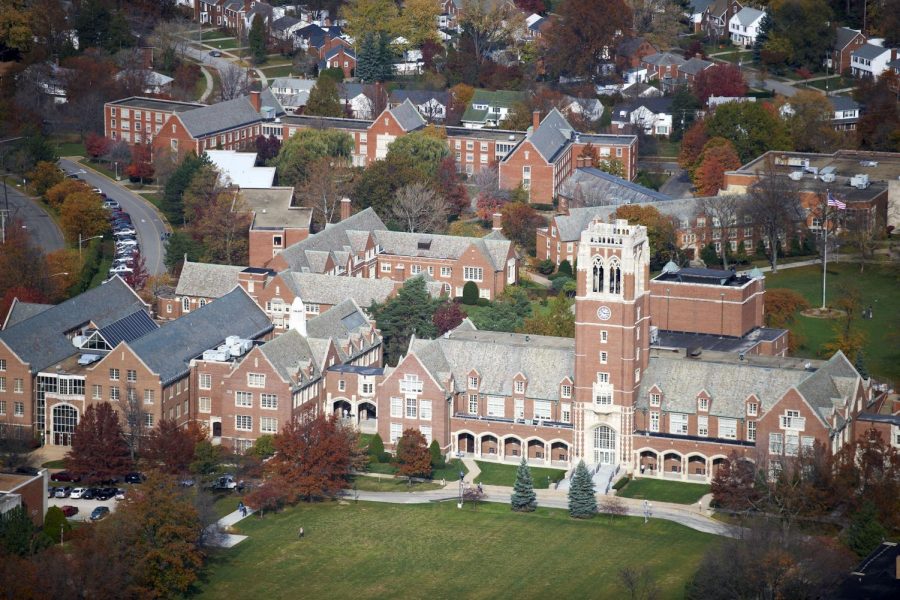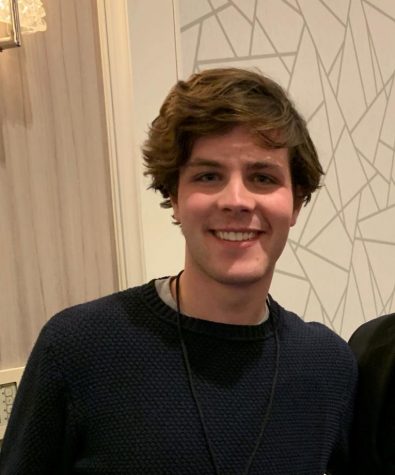Humans of JCU: Professor Pam Mason
Photo courtesy of John Carroll University.
Pam Mason, a retiring professor in the political science department, shares her story with The Carroll News.
May 18, 2022
When I asked Professor Pamela Mason what made her want to pursue a career in Political Science, now, more than 40 years later, her face lit up as she let out a soft, revealing chuckle, replying simply: “I had an experience.” In a way familiar to her students, she then launched into a winding and gripping story prodding at some profound questions at the heart of the human condition.
This time, however, the story was a deeply personal one –– a story of adventure through the Amazon rainforest, of contact with remote people and, ultimately, of questioning what it means to be human.
After nearly three decades at John Carroll, Mason will retire at the end of this semester. She leaves behind a legacy as a dedicated instructor and an example of relentless curiosity. Or as a student of hers, Eric Fogle ‘23, put it, “my favorite quality of hers has been her persistent care and wonder at the material she teaches. Professors and students alike can learn from her.”
I sat down with Mason earlier this month to discuss her life, the world, politics and the crisscrossing trajectory of all three.
Born in 1952 in Oak Ridge, Tennessee, global politics deeply impacted her life from the very beginning. Oak Ridge was a town developed by the federal government during World War II to serve as a center for nuclear research. Mason’s father worked in the nuclear industry, a career that brought her family across the country from Tennessee to Pennsylvania to South Carolina and ultimately to St. Louis, Missouri, where she spent most of her childhood. Her parents were steeped in the broad post-war consensus of early Cold War politics.
“There was an overriding sense at that time of conformity. And they were just sort of mainstream,” she explained.
However, as she left St. Louis to attend college in Austin, Texas, she, like many of her peers, joined the anti-war movement in protest of America’s war in Vietnam. She recalls, with measured excitement, the feeling on campus at that time –– a feeling of being a part of something important. “That was the era,” she said of just how wide-spread the anti-war sentiment was on campus.
Shortly before the fall of Saigon and the total withdrawal of American troops from Vietnam, Mason moved to London to study modern European history.
“I was trying to figure out what to do with my life after undergrad. And I knew I wanted to travel, and I knew I didn’t have any money. And so what to do? Well, I had this wonderful advisor, and he said, ‘Have you ever heard of the London School of Economics?’ I said, ‘No.’”
Despite her unfamiliarity with the LSE and “the basics of [her] particular subfield,” she applied to the school and was accepted for the fall of 1975. Studying and living in London was a “huge challenge” but a “wonderful, life-changing experience.”
The seeds of her career-long interest in political thought took root while living in Europe. “It really opened my mind and just opened me to the diversities of people and to the diversities of ways of thought.”
She explained that the window of acceptable political positions in Europe is broader there than in the United States, especially at that time. In the United States “Democrats and Republicans agree on some foundational values, and one of those is a particular form of capitalism.” In the Cold War America from which she hailed, communism was a “dirty word.” But in Europe she found that “communists are part of the regular political spectrum in lots of countries. And socialists, and really hard-right nationalists, too.”
Her exposure to that expansive range of thought made her question some of her fundamental assumptions about politics; she wondered about why some ideas that are unthinkable in some parts of the world are commonplace in others. However, the moment she decided she would devote her career to the academic study of politics came a few years later.
After her studies in London, Mason returned to Charlotte, North Carolina –– where her father’s work had since taken the family –– to work for a small publishing company. Soon after, her boyfriend at the paper got an assignment to cover a Charlotte-based Bible translation group that specialized in translating Bibles into languages spoken by remote peoples. As part of this assignment, he traveled to the Peruvian Amazon.
“I had always wanted to visit the Amazon jungle –– ever since my brother and I read these adventure books when we were little. And so I thought, ‘this is my chance.’” So Mason joined up as a photographer (something she had no experience doing, but learned quickly ) and flew into a small, remote town on the Brazilian border. They spent two or three days there, living with the local people. She told me it was an “extraordinary experience that marked [her] for life.”
The stark difference in how these remote people lived moved Mason deeply. She was struck by their woven garments, their lack of shoes, their indigenous language, their lifestyle –– which was increasingly threatened by expansion into the rainforest. Most strikingly, however, she observed differences in things as simple as the way they walked. She explained that “peoples’ feet are formed according to what they do with them over their lives. And, these people had been going up and down muddy embankments, walking over stones in rivers, and using their feet differently than we did…and we were just falling all over the place.”
Just as a lifetime of traversing tricky jungle terrain forms a person’s feet, Mason began to wonder how such remote living formed the way people thought. The question that emerged from the Amazon has animated her thinking ever since: “How on earth do we come to think the way we think? Because we are humans on this earth together, and what has formed in our heads is so different.”
When she returned to the States, and to her job as a junior administrator at the publishing company, she quickly realized she couldn’t continue with her career there; something had changed. So, she applied to the University of North Carolina to earn her PhD in Political Science.
Mason arrived at JCU in 1993. She had never heard of the University before applying and she hadn’t even visited Cleveland. “But I liked John Carroll immediately, I liked Cleveland immediately and that’s all I needed.”
Since arriving at Carroll, Mason has directed the East Asian Studies program, helped found the Center for Global Education, served as an assistant dean and has remained a pillar of the Political Science Department where she primarily teaches political theory and comparative politics.
Reflecting on nearly three decades at JCU, she thinks the current college generation “is in a time of remarkable change.” She told me that, in a certain sense, this generation and her generation were born into a similar, fractured world –– a world that, for the generations in between, seemed almost whole. But, that era of unchallenged American hegemony is over. The result is a more complex, confusing and dynamic world.
She worries that with the rise of autocracy globally and the breakdown of democratic education at home, “will have had a really sad effect on our ability to remain democratic in our vision and in our policies.”
Despite these anxieties, she told me “the reality is that young people always have the huge challenge of inheriting a world that they didn’t build –– that they’re formed by but also critical of. And education gives you the tools that you can fight with…the tools you can build with.”
Professor Mason has dedicated her career to doing just that –– to gently considering the world and sharing what she’s learned with future generations so that they might continue the work of building something better.














Dr. B • May 18, 2022 at 3:40 pm
Wonderful story, TJ.